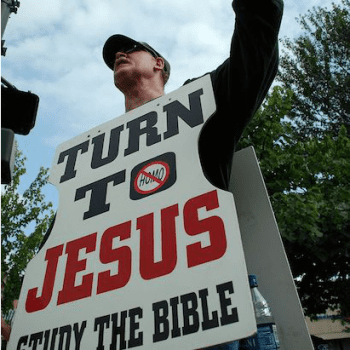
By Jonathan MS Pearce –
The media is frantically telling us that, in the UK, the Lord’s Prayer has been banned from cinema adverts! NO IT HASN’T.
(Okay, deep breath.)
I just want to set the record straight since this is being mis-reported all over the various national and no doubt international media. I even sent a complaint to the BBC, and they were gracious enough to have changed their website headline, though they still insist on reporting it incorrectly on their TV news.
Let me set you up with the context. The Church of England, the dwindling religious authority entwined with the State in the UK, has put together a minute-long advert of various people, from “normal people” to the senior members of the clergy, singing or saying the Lord’s Prayer in the hope that the advert, aimed to be shown before the movie sensation that will be Star Wars, will evoke some kind of religious experience. People will either rekindle their love affair with the church, or remember that Christ is what underpins Christmas. Or something.
Or they will get rather annoyed that some saccharine, twee notion of religion will be thrust in front of their eyes, unable to get out of their popcorn enshrined cinematic prison, instead of gearing up for what they chose: nerdy space shenanigans with its own hotly-anticipated Jedi Force religion. (Yes, in the 2001 census, over 390,000 people in the UK stated Jedi as their religion).
This advert will not be shown. And apparently, according to the media, this constitutes a banning of the advert. This, in turn, has fuelled religious whingeing and remonstrating, in the face of such supposed religious discrimination.
Here is how the BBC report it, having changed “ban” to “snub” and “refusal”:
The Church called the decision “plain silly” and warned it could have a “chilling” effect on free speech….
However, the Digital Cinema Media (DCM) agency, which handles British film advertising for the major cinema chains, Odeon, Cineworld and Vue, refused to show the advert because it believed it would risk upsetting or offending audiences.
In a statement, DCM said it had a policy of not accepting political or religious advertising content in its cinemas.
It said that “some advertisements – unintentionally or otherwise – could cause offence to those of differing political persuasions, as well as to those of differing faiths and indeed of no faith,” and that “in this regard, DCM treats all political or religious beliefs equally”.
This does not constitute a ban. This is the first thing I want to clear up. A cinema advert supply company has chosen not to run some adverts. The company (DCM) supplies some of the top cinema chains who, as a result, will not be running the advert (not because they choose not to, but because the company who supplies them has chosen not to).
Here is the Google definition of “ban”:
ban1
verb: ban; 3rd person present: bans; past tense: banned; past participle: banned; gerund or present participle: banning
officially or legally prohibit (something).
“parking is banned around the harbour in summer”
officially prevent (someone) from doing something.
“her son was banned for life from the Centre”
There is no official or legal prohibition, there is a mere decision not to run something from a private entity. “Banning”, as a term, has strong connotations which runs the risk, if used, of being misinterpreted to be something which it is not and evoking inappropriate reactions. Which is what has happened.
Corporations have legal identity similar to an individual (as problematic as that concept may be – see the excellent documentary The Corporation on this point). If I refused to buy sugar from my supermarket, my supermarket cannot have me up for that as being anti-sugar! No, this is a commercial decision between two private entities based on existing policy.
Why is there such a policy?
Well, the company has had to create one that, happily for the skeptic, seems to be based on empirical evidence. They had received negative feedback when they ran adverts which supported both the “Yes” and “No” campaigns for the Scottish Independence referendum. Cinema goers were fairly represented by both sides of the argument in these propaganda adverts. And yet, even though both sides were supported, this was not what the audience wanted to see. People go to the cinema for escapism, not to be fronted with ideological propaganda, it appears. DCM reacted to this negative feedback in producing a policy which sought not to advertise political or religious ideologically motivated adverts. The policy can be found here and includes these quotes:
To be approved, an advertisement must not in the reasonable opinion of DCM constitute political or religious advertising….
Political or religious advertising means advertising which wholly or partly advertises any religion, faith or equivalent systems of belief (including any absence of belief) or any part of any religion, faith or such equivalent systems of belief.
All seems pretty fair to me.
According to the British Attitudes Survey, the majority of the UK feels themselves as belonging to no religion, let alone being Christians who would like to hear the Lord’s Prayer, or those wavering and who would appreciate it. In this light, and with DCM not predicting this would go public and cause anything like a backlash, the decision was not one of discrimination, but one of strategic commercial choice.
And before you cry “Bakeries and cakes for gay people!” in reference to the bakery who refused to give their goods and services to a gay couple based on their sexuality, the press and media are different.
One could take this to the extreme. Imagine if they had to, by duty, show any advert that they were offered, that they had no editorial discretion over any of their media output. Could you submit a 48-hour call to prayer and they would be duty bound to produce it? In the US, the media are protected in their editorial discretion by the First Amendment, as this source explains:
A private business is allowed to make its own editorial decisions about what to publish. The First Amendment right to freedom of the press prevents the state from interfering with private editorial decision-making, as was made clear in the Miami Herald Publishing Co. v. Tornillo case, 418 U.S. 241 (1974).
This includes the right to turn away advertisements, as the Supreme Court noted in a decision the previous year when it refused to extend the FCC’s “Fairness Doctrine” to broadcast advertising. (CBS v. Democratic National Committee, 412 U.S. 94, 1973).
Consider recent instances of networks broadcasting the Super Bowl — they regularly turn away ads from political groups such as MoveOn.org or anything else deemed too racy for the public, such as PETA’s regular attempts to grab attention.
Merely by virtue of being a 501(c)(3), not-for-profit organizations do not surrender their First Amendment rights. Just last year, the Supreme Court in the Citizens United v. FEC case upheld free speech rights for 501(c)(4) tax-exempt organizations, striking down campaign finance regulations that limited the ability of the organization to spend money in political campaigns, a kind of speech.
In short, with very few exceptions, publishers have a right under the First Amendment to make editorial decisions without the state, or the courts, interfering with them. This includes the right to choose which advertisements to accept and which to reject. While the contents of advertising can be regulated — consider the Fair Housing Act requirements that advertising not include discriminatory content — it remains in the publisher’s discretion whether to publish an advertisement in the first place.
There are heaps and heaps of examples, here in the UK, of media or organisations refusing to run adverts for a whole variety of reasons. Sky, a cable channel, refuses to run adverts for a rival (BT) sports channel. The Daily Mail and Daily Telegraph (the same papers which are complaining about the cinema advert) refuse to run adverts on tax dodging. I will not burden you with countless other examples, but here is a ruling from the European Convention on Human Rights, as pertaining to Polish media and a demand to advertise from one individual. This should give you a flavour of how this is not viewed under the same terms of discrimination as the bakery:
However, the Strasbourg Court unanimously decided that the guarantee of freedom of expression had not been breached. The Court held that privately owned newspapers must be free to exercise editorial discretion in deciding whether to publish materials submitted to the editorial team. In the view of the ECtHR, the State’s obligation to ensure the individual’s freedom of expression does not mean that such individuals have an unrestricted access to the media in order to publish any content whatsoever. The Court also resolved that the media had the right to establish and apply their own policies in respect of advertisements.
The ECtHR further noted that the newspaper’s refusal to publish the applicant’s advert did not deprive him of the ability to disseminate or otherwise market the book itself.
HFHR has filed an amicus curiae brief in the proceedings pending before the ECtHR. “In the brief we argued that the case is of significant importance in the context of the Convention ‘radiating’ onto relations between individuals”, says Dorota Głowacka, HFHR lawyer. “We emphasised, on a number of occasions, that guarantees of the freedom of expression should be respected not only in state-citizen relationships but also in dealings between private entities”, adds Ms Głowacka.
As mentioned, one can imagine the chaos in the different media if they were duty bound to print whatever any other entity demanded of them. You could get hold of a right leaning newspaper and fill it completely with left-wing ideology through adverts, rendering the whole scenario ridiculous. You could ram a right-leaning TV channel like FOX News full of pro-Democrat adverts, or adverts which dispel the channel’s own misinformation. Whilst the latter may be good fun and a sensible thing to do, you can see how this would undo the whole basis of proprietary ownership over content.
Private media organisations have the right to editorial discretion.
What has annoyed me in this case is the media’s pandering to the those who are whingeing about this, not realising that it has added plenty of ammunition to social media religious warriors and the right-wing press, who support the Church’s stance.
The simple incorrect use of the word “ban” is irresponsible and I request, most probably in absolute vain, that media outlets do not erroneously use it.
As the BBC continues, in explaining why the Church is wrong to get upset:
But Terry Sanderson, president of the National Secular Society, said: “The Church of England is arrogant to imagine it has an automatic right to foist its opinions upon a captive audience who have paid good money for a completely different experience.
“The Church does not hesitate to ban things that it deems inappropriate from its own church halls – things like yoga. The cinema chains are simply exercising the same right.”
And that last point is pretty pertinent. I would love Muslim groups to request to use church halls up and down the country and see the reaction!
The reaction from the Church of England is somewhat predictable, and there are claims that they are going to take this to court. In some sense, I would be interested to see what would happen. In another sense, just get over yourselves.
The question should then follow: how would I feel if the company refused to run humanist or atheist adverts, especially if they were totally uplifting and in accordance with my views?
I would like to think that I would react in exactly the same way, given a clear understanding of the context, and in the knowledge that all worldviews (political and religious or lack thereof) were treated in the same way.
 Jonathan MS Pearce is a philosopher, author, teacher, public speaker and blogger from Hampshire in the UK. Running a small skeptical publishing company (Onus Books), he looks to spread the skeptical word. He has authored several books including Free Will? An Investigation into whether we have free will or whether I was always going to write this book, The Nativity: A Critical Examination and The Little Book Of Unholy Questions.
Jonathan MS Pearce is a philosopher, author, teacher, public speaker and blogger from Hampshire in the UK. Running a small skeptical publishing company (Onus Books), he looks to spread the skeptical word. He has authored several books including Free Will? An Investigation into whether we have free will or whether I was always going to write this book, The Nativity: A Critical Examination and The Little Book Of Unholy Questions.















